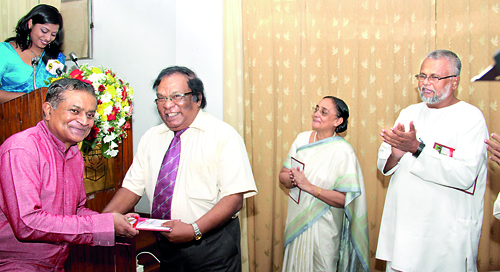Traditional thinking to enterprise farmers: new approach offered by former UN/FAO expert
Supporting the local farmer community through a microcredit and microfinance has now conceptualised to becoming a new way of thinking as identified by the former UN/FAO Marketing Economist Duraisamy Kumaran Thangarajah in his new book titled “Traditional Agricultural Micro-Knowledge Entrepreneurship for Rapid Livelihood Development.”

Author Kumaran Thangarajah (left) presenting the book at the recent launch
Mr. Thangarajah believes that the concept of traditional thinking or traditional knowledge in carrying out the agricultural activities will empower and enrich the pro poor and small farmers to become economically independent with self-esteem.
This approach is basically facilitating the potential marketing of indigenous know-how. It is, of course, an intellectual branding and trading mechanism to buy the know-how from the indigenous villagers and sell it to consumers with a mechanism of facilitation and value addition. This approach is to stand for and pass the acid test yet.
The book has been written with the aim of creating awareness among the pro-poor micro farmers regarding the value of identifying the commercialisation of their indigenous knowledge; and also to assist in the establishment of village level knowledge exchange units to formulate and package their “own” knowledge product.
In his preface it was stated that traditionally, Knowledge Entrepreneurship (KE) is described as the ability to recognise or create an opportunity and take action aimed at realising the innovative practice or product. KE is said to differ from economic entrepreneurship in that it does not aim at the realisation of monetary profit but focuses on personal transformation. This approach is said to be unique in that it provides the approaches to earn incomes from traditional practices.
The first section of the book looks at the traditional knowledge systems embedded in the cultural traditions of the local communities with an eye on the past, present and future of the concept. The second section delves in the “Knowledge Creation” and attempts to identify the needs of the mind to be used for the better advantage of enhancing “intellectual capital” that would be of necessity for both the individual and society at large. The author notes that creating knowledge through a stable mind could impact on a larger global scale in a bid to provide a contextual solution to an identified need.
Mr. Thangarajah takes into account the “Knowledge Creation Process” and also looks deeper into the thought process adopted in terms of meditation, power of thinking and knowledge training.
“Knowledge Marketing” discussed in the third section refers to this aspect of “Knowledge Entrepreneurship” to identifying anticipating and satisfying users, through the types of knowledge in demand. In this section he takes a closer look at the expanded knowledge enterprise structure for trading as well. Section four focuses on the “Evolution of Humanisation of Innovative Technologies”. In this chapter the author clearly identifies the benefits and de-merits of electronic commerce and its future in addition to highlighting the guidelines for E-Commerce Plus and a graphical representation of an effective tool to provide a “Knowledge Marketing” service level par excellence. In the fifth section the author takes into account the “Knowledge Science for Integration” an approach that proposes to addresses the area of knowledge in a holistic sense in order to study the multifarious and inter-reactive issues and their dynamic inter-relationships. This section also once again looks at the “Knowledge Creation Process” and spotlights on a “Decision Support Pyramid of the Humanised Knowledge Enterprise”. This “Pyramid Analysis” is to be undertaken for each element of the key processes in the traditional value chain, the author notes.
The final section discusses the subject of “Knowledge Re-Engineering” that aims at identifying the need for a system that benefits mankind and consequently looks at ways and means for the proponents and implementers of these systems to reap reasonable levels of benefit not dictated by greed alone. This section also looks at the areas of “Elements of Intellectual Capital”, “Measuring Intellectual Capital” and “Value Driven Intellectual Capital”. Mr. Thangarajah is a Marketing Strategist, Economist, Agriculturalist, Lecturer and Forward Thinker and holds a Bachelors degree from the University of Peradeniya Sri Lanka and a Masters Degree in Agricultural and Food Marketing from the University of Newcastle upon Tyne, United Kingdom.
His work experience of over 30 years in marketing covers from Lyons Tetley in London, Ministry of Plan Implementation in Sri Lanka, Marketing Economist with FAO/UN, Market Intelligence Co-ordination with Telstra Corporation Australia and Senior Level Consultancies in Fishery, Forestry, Programming, Information Communication Technology and Wellness industry sectors in Sri Lanka, India, Singapore and Thailand.


